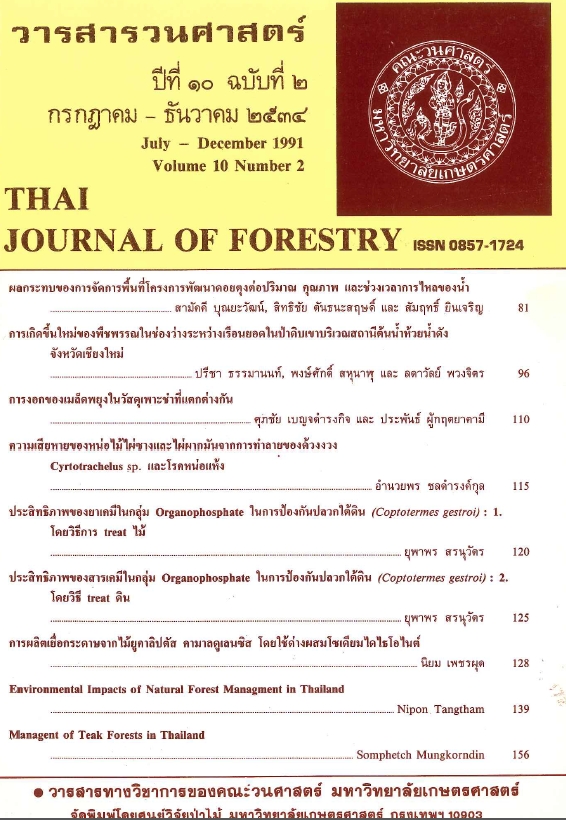ENVIRONMENTAL IMPACTS OF NATURAL FOREST MANAGEMENT IN THAILAND
Main Article Content
บทคัดย่อ
Environmental impacts of natural forest management in Thailand were formulated through available information and discussion in various seminars. The quantitative evidence of this study is rather few. Only descriptive and semi- quantitative impacts were discussed in some current publications. It could be generally concluded that, timber harvesting by any silvicultural system ever used in the natural forest of Thailand produced less environmental impact in terms of soil and water deterioration than that caused by agronomic practices. Less than 0.5 ton/ha of sediment was found in the first year of logging operation under selection cutting in the western region. Converting moist evergreen forest in the south into para-rubber plantation, which is equivalent to reforestation after clearcutting, caused about 7 ton/ha/yr of soil loss. Since the selection cutting which has been applied in various types of forest in Thailand for almost century resulted in mutually destructive both the socio- economic and forest ecological systems, clearcutting system at optimal size ranging from 600-2,000 rais and immediatly reforested by suitable species is recommended for forest management in the future. Based on the past situation, however, it is not a matter of environmental consequences to judge whether the forest can be sustainably managed but the socio- political pressures. which sofar received less attention to seriously resolve by the government. Without people's realization on the essential roles of forest on environment and their quality of life, the ideal sustainable management of natural forests in this country is hardly possible.
Downloads
Article Details

อนุญาตภายใต้เงื่อนไข Creative Commons Attribution-NonCommercial-NoDerivatives 4.0 International License.
ข้าพเจ้าและผู้เขียนร่วม (ถ้ามี) ขอรับรองว่า ต้นฉบับที่เสนอมานี้ยังไม่เคยได้รับการตีพิมพ์และไม่ได้อยู่ในระหว่างกระบวนการพิจารณาตีพิมพ์ลงในวารสารหรือสิ่งตีพิมพ์อื่นใด ข้าพเจ้าและผู้เขียนร่วม (ถ้ามี) ยอมรับหลักเกณฑ์และเงื่อนไขการพิจารณาต้นฉบับ ทั้งยินยอมให้กองบรรณาธิการมีสิทธิ์พิจารณาและตรวจแก้ต้นฉบับได้ตามที่เห็นสมควร พร้อมนี้ขอมอบลิขสิทธิ์ผลงานที่ได้รับการตีพิมพ์ให้แก่วารสารวนศาสตร์ คณะวนศาสตร์ มหาวิทยาลัยเกษตรศาสตร์ กรณีมีการฟ้องร้องเรื่องการละเมิดลิขสิทธิ์เกี่ยวกับภาพ กราฟ ข้อความส่วนใดส่วนหนึ่ง หรือ ข้อคิดเห็นที่ปรากฏในผลงาน ให้เป็นความรับผิดชอบของข้าพเจ้าและผู้เขียนร่วม (ถ้ามี) แต่เพียงฝ่ายเดียว และหากข้าพเจ้าและผู้เขียนร่วม (ถ้ามี) ประสงค์ถอนบทความในระหว่างกระบวนการพิจารณาของทางวารสาร ข้าพเจ้าและผู้เขียนร่วม (ถ้ามี) ยินดีรับผิดชอบค่าใช้จ่ายทั้งหมดที่เกิดขึ้นในกระบวนการพิจารณาบทความนั้น”


